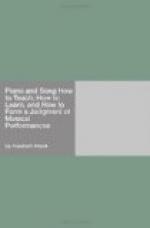(Lizzie refuses to play.)
DOMINIE. Mr. Shepard, let Lizzie play a few scales or some chords; a few finger exercises, or some easy dance without notes.
SHEPARD. She has nothing of that kind ready. You see I always take up one piece after another, and have each one played as well as I can; she repeats the difficult parts, I write the proper fingering over them, and am very particular that she does not use the wrong fingers. I have taken a great deal of pains, and quite worn myself out over the lessons. Lizzie does the same, and practises her pieces two hours a day; but—but—
(Lizzie goes away with Emma.)
DOMINIE. Mr. Shepard, with the best intentions in the world, you will never accomplish your end. Even if Miss Lizzie is only to play as an amateur, and is not intended for any thing higher, for which in fact she has not sufficient talent, you must pay some attention beforehand to the acquirement of a correct tone, and get rid of this robin-red-breast touch; and you must then endeavor, by scales and exercises of every kind, to give to her hands and fingers so much firmness, decision, and dexterity, that she can master her pieces, at least with a certain distinct tone and a tolerable touch. You are not less in error in the choice of her pieces, which are far too difficult,—a fault of most teachers, even with the most skilful pupils. The pieces which your pupils are to execute should be below their mechanical powers; for, otherwise, the struggle with difficulties robs the player of all confidence in the performance, and gives rise to stumbling, bungling, and hurry. The mechanical powers should be cultivated by studies and exercises, in preference to pieces, at least to those of certain famous composers, who do not write in a manner adapted to the piano; or who, at any rate, regard the music as of more importance than the player. This may apply even to Beethoven, in the higher grade of composition; for his music is full of danger for the performer. The only course which can ever lead to a sure result, without wearying both pupil and parent, and without making piano-playing distasteful, is first to lay a foundation in mechanical power, and then to go on with the easier pieces by Huenten and Burgmueller. If you try to produce the mechanical dexterity essential for piano performance by the study of pieces, except with the most careful selection, you will waste a great deal of time and deprive the pupil of all pleasure and interest; and the young Lizzie will be much more interested in the hope of a husband than in the satisfaction of performing a piece which will give pleasure to herself and her friends. There can be no success without gradual development and culture, without a plan, without consideration and reflection,—in fact, without a proper method. How can there be any good result, if the pupil has to try at the same time to play with a correct touch, with the proper fingering, in time, with proper phrasing, to move the fingers rightly, to gain familiarity with the notes, and to avoid the confusion between the treble and the bass notes,—and in fact has to struggle with every thing at once? And what vexations! what loss of time without success!




